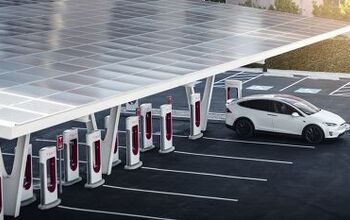Incentive Money Gone, Electric Car Sales Have Dried Up In Georgia

Electric car sales in Georgia have halted after that state stopped offering incentives and started charging a $200 annual fee to recoup lost gas tax revenue, the Atlanta Journal-Constitution reported.
New electric vehicle registrations plummeted 89 percent from June to August after the state stopped offering a $5,000 tax break on top of the $7,500 federal incentive. Georgia’s incentive was one of the most generous in the country.
Georgia’s electric purge could portend a future in highly incentivized states, such as California and Colorado, where electric incentives and sales are still relatively strong.
According to the International Council on Clean Transportation, countries with direct incentives (such as tax breaks, or one-time bonus payments) have considerably higher EV sales than countries without incentives, however that isn’t always universally true.
“A counter-example is the UK, where despite relatively high incentives electric vehicle sales are still very low,” Dr. Peter Mock, Managing Director of ICCT Europe, said in a statement.
Earlier this year, British Columbia announced it would bring back clean vehicle incentives after allowing the credit to expire in 2014 and sales exploding in other provinces. Sales of hybrid, plug-in hybrid and electric vehicles rose in BC without the credit, but not as fast as sales in Quebec and Ontario.
A clean energy proponent in Atlanta said that while repealing the tax credit for EVs could save the state $66 million in 2016 and $190 million by 2020, but that spending on fuel would rise by more than $188 million over the next 16 years, lowering spending by consumers, according to a study by Keybridge Research.
“This important study shows that the ZEV credit is a smart investment for the state of Georgia, as well as Georgian consumers and businesses,” Robbie Diamond, President and CEO of Securing America’s Future Energy, said earlier this year according to Cleantechnica.

More by Aaron Cole
Latest Car Reviews
Read moreLatest Product Reviews
Read moreRecent Comments
- Namesakeone Doesn't China hold a lot of our debt? I honestly don't know, but if they do, how high will the tarriffs climb before China retaliates--by calling in that debt? And really screwing our economy like no influx of Chinese products can? Again, I don't know. If someone out there in TTACland knows better than me, please enlighten me.
- ToolGuy I'm considering purchasing a few new Aston Martin vehicles.
- Spamvw 13 spoke rims from a 2005 Golf, I approve, as I have them on my '02 JSW TDI that hit 480k today.
- ToolGuy New car prices make me queasy will this help with that?
- Kcflyer On the bright side I just saw a commercial where the army is advertising the fact that women are now part of tank crews. I'm sure the compromises necessary to put women in front line combat arms won't in any way weaken our armed forces ability to win wars in the future. But, hey, at least that new BYD SUV will cost more, thanks uncle Joe.
































Comments
Join the conversation
$50 oil and $2.00 gasoline have pretty much destroyed the incentive to give major tax breaks to EV's for the next 10 or 20 years. If you really look at the current tax incentives, they really make no sense even given $100 oil when you figure in pollution externalities.
Reliance on a fuel tax for funding roads will soon be obsolete. As the numbers of alternative fuel and electric vehicles increase it will be wiser to switch to a road usage tax. Annual review of mileage can be correlated to a tax/mile charge. This would also remove the revenue losses from hybrid/high mpg vehicles.